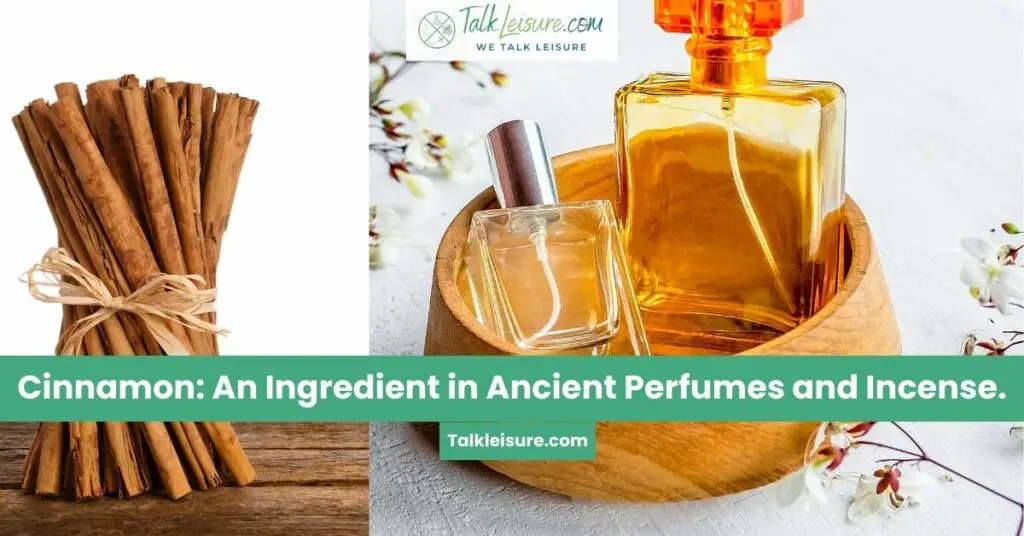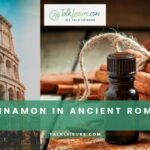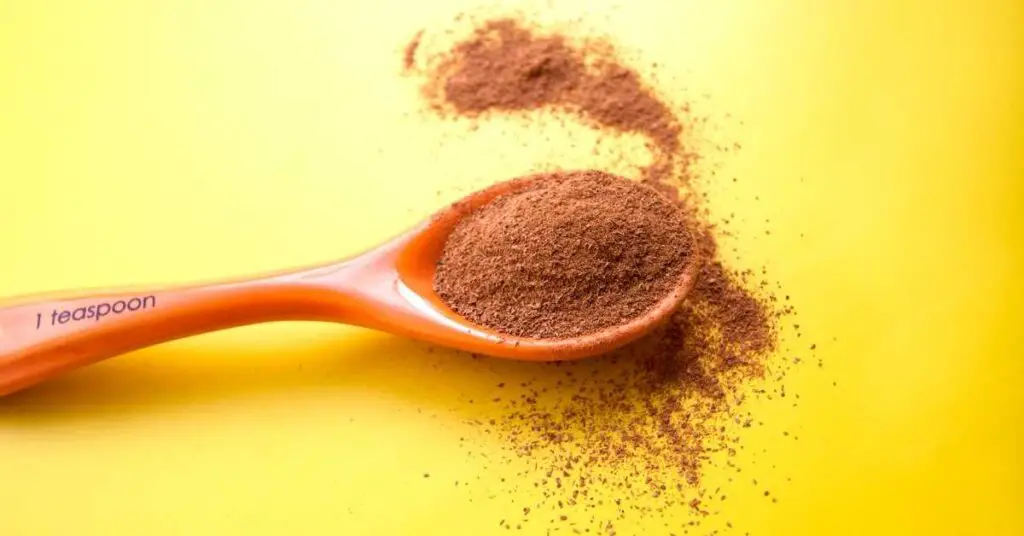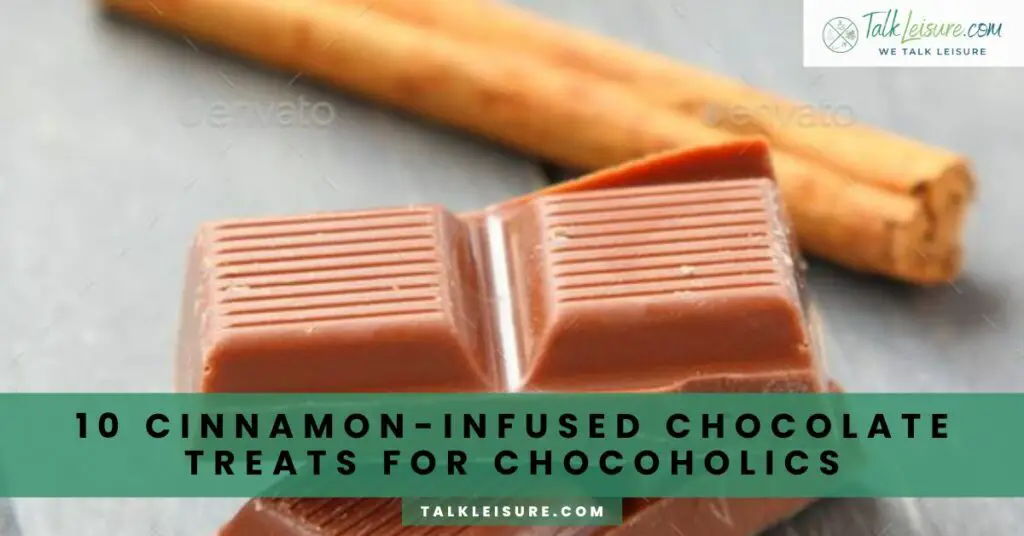Cinnamon has been a unique element in incense and perfumes for a very long time.
It’s not just a spice for baking or flavoring drinks; it has a fascinating history that goes back centuries.
Ever since it was discovered, people have loved cinnamon’s aroma and employed it for a variety of purposes, most notably to create pleasant scents.
Let’s explore how cinnamon came to be used in incense and perfumes of antiquity and why it is still vital now.
History and Background of Cinnamon As An Ancient Ingredient in Perfumes and Incense.
Cinnamon has been used for its fragrance since ancient times.
In Egypt, it was used to embalm mummies, and in China, it was used for medicinal purposes.
The Greeks and Romans burned cinnamon during funerals, and in India, it was used in Ayurvedic medicine.
In Europe during the medieval period, cinnamon was considered a luxury item and was used in perfumes, incense, and for flavoring food and wine.
Today, it is widely used in the perfume industry due to its sweet and spicy aroma.
Cinnamon is a versatile ingredient and is often combined with other essential oils to create unique fragrances.
Cinnamon is also used in incense due to its aromatic properties.
It is believed to promote relaxation, reduce stress, and improve focus and concentration.
Cinnamon incense is often used during meditation and yoga practices.
What Is The Chemistry Behind Cinnamon’s Aroma?
Cinnamon has an undeniably distinct and tempting aroma that makes it one of the most sought-after ingredients in perfumes and other fragrances.
Its sweet and spicy scent can evoke various emotions and memories, making it a versatile and popular ingredient.
The essential oil extracted from cinnamon bark contains various compounds, including cinnamaldehyde, eugenol, and linalool, which give cinnamon its unique fragrance profile.
Cinnamaldehyde, in particular, is responsible for the sweet cinnamon scent, while eugenol contributes to its spicy undertones.
When combined with other fragrance notes such as vanilla, nutmeg, and clove, cinnamon can create warm and comforting scents that are perfect for fall and winter fragrances.
What Are The Innovations and Trends in Cinnamon-Infused Perfumery?

Cinnamon has been used for centuries as a fragrance ingredient in perfumery and incense.
However, modern perfumers have taken this classic ingredient and given it a contemporary spin, resulting in cinnamon-infused scents that showcase its versatility and appeal.
Cinnamon’s Influence on Design and Packaging
Cinnamon doesn’t just have a place in perfumery, it can also be a valuable ingredient in the packaging and design of scented products.
The warm and cozy scent of cinnamon has a significant impact on the visual and tactile experience of the product packaging, and many brands use this to their advantage.
Incorporating cinnamon into packaging design can generate a sense of warmth, indulgence, and comfort in potential customers.
Cinnamon’s rich brown hues and unique texture make it an excellent material for creating labels, tags, and even wrapping paper.
Brands can also use cinnamon sticks or other cinnamon-scented materials in gift boxes or product boxes to add an extra layer of sensory experience for buyers.
Cinnamon in Personal Care Beyond Perfumes
Cinnamon isn’t just a popular ingredient in perfumes and incense; it has numerous benefits when used in personal care products as well.
The warming and comforting scent of cinnamon is perfect for creating a luxurious and indulgent experience in body care products.
Cinnamon is known to have antibacterial properties, making it a great addition to products that combat acne and other skin infections.
Its antimicrobial properties also make it an excellent ingredient in toothpaste and mouthwash, promoting oral health and fresh breath.
Moreover, cinnamon has natural exfoliating properties, making it a great ingredient in body scrubs and polishes, leaving your skin refreshed and rejuvenated.
Cinnamon’s versatility in personal care extends to hair care as well.
Cinnamon oil improves blood circulation to the scalp, promoting hair growth and preventing hair loss.
The spice is a natural conditioner and gives hair a healthy shine.
What Are Some of the Ingredients That Cinnamon Can be Paired With in the Realm of Perfumery to Create Captivating and Harmonious Fragrances?
Cinnamon is an incredibly versatile fragrance used in perfumery for centuries.
Its warm, sweet, and spicy scent blends well with other fragrance notes to create unique aroma compositions.
Here are some of the popular fragrance notes that cinnamon can be paired with in perfumery.
Vanilla
Cinnamon and vanilla create a warm and cozy scent, perfect for fall and winter fragrances.
Citrus
Cinnamon’s spicy notes add depth and complexity when blended with citrusy fragrances, such as bergamot, lemon, and orange.
Floral
When combined with floral notes, cinnamon adds warmth and enhances the fragrance’s sweet and floral aspects.
Woody
Cinnamon’s spicy warmth complements and enhances the earthy and woody scents of cedarwood, sandalwood, and patchouli.
What Are The Benefits of Cinnamon in Perfumes and Incense?
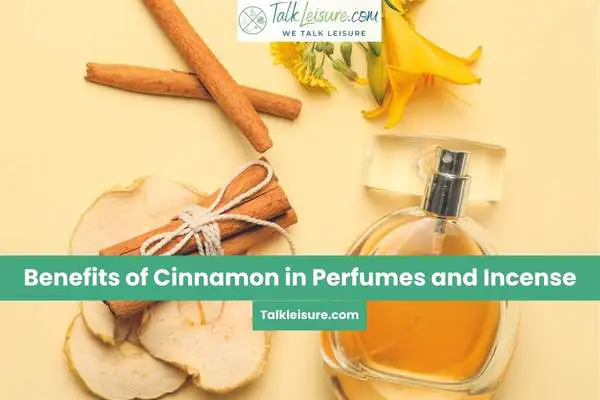
Cinnamon has been a popular ingredient in perfumes and incense for centuries.
Its sweet and warm aroma makes it a versatile fragrance note that blends well with other scents to create unique, captivating fragrances.
Here are some of the benefits of using cinnamon in perfumes and incense.
What Are The Cinnamon’s Therapeutic Properties in Aromatherapy?
Cinnamon has therapeutic properties that make it a valuable ingredient in aromatherapy.
Its warm and comforting scent can help alleviate stress, insomnia, and anxiety.
In addition, cinnamon oil has antibacterial and antifungal properties, making it an excellent choice for people suffering from respiratory issues such as colds and flu.
How Cinnamon Can Enhance the Mood and Atmosphere?
Cinnamon’s warm and cozy fragrance has a significant impact on the mood and atmosphere of the space where it is being used.
When used in perfumes or incense, it can create a sense of calmness, happiness, and relaxation.
Additionally, cinnamon’s unique aroma can evoke feelings of nostalgia, making it an excellent choice for products meant to create a warm and cozy atmosphere.
Conclusion
Cinnamon has been used for over two thousand years in perfumery and incense-making, and its popularity shows no signs of waning.
Due to its warm, spicy aroma, cinnamon is a commonly used ingredient in numerous perfumes, body care products, and scented candles.
Cinnamon’s versatility in perfumery goes beyond just being a fragrance enhancer.
Cinnamon also has antimicrobial and antibacterial properties, making it ideal for use in personal care products such as toothpaste and mouthwash.
Cinnamon is a valuable addition to any perfumer’s toolkit, providing more than just a pleasing scent.
The benefits of cinnamon extend to the realm of health and wellness, giving perfumery a more holistic approach.
FAQs
01. What Were the Ingredients in Ancient Perfume?
Perfumery has a long and rich history dating back to ancient times.
Perfumes were essential in religious rituals, celebrations, and daily life.
The ingredients used in these perfumes were derived from natural products such as plants, flowers, and herbs.
One of the most popular ingredients in ancient perfumes was frankincense, which was burned as incense and used in various medicinal remedies.
Myrrh was also commonly used as an ingredient in perfumes and incense.
Other ingredients included cinnamon, rose, and lavender.
These choices were based not only on their aromatic qualities but also on their perceived spiritual and medicinal properties.
Ancient Egyptians were known to use a wide range of ingredients such as lotus, jasmine, and myrtle, while ancient Greeks favored rose and iris.
Romans, meanwhile, preferred the fragrances of pine, juniper, and even animal secretions such as musk.
02. What Is The Spiritual Use of Cinnamon Oil?
Cinnamon essential oil has been used for spiritual and medicinal purposes for many centuries.
According to ancient folklore, cinnamon is associated with abundance, prosperity, and good fortune.
It is believed to have a powerful energy that can attract wealth, success, and positive vibes.
The spicy and sweet aroma of cinnamon oil is also believed to stimulate the senses and uplift the spirit.
It can help to promote relaxation, calmness, and tranquility.
It is no wonder that cinnamon oil is often used in aromatherapy to create a relaxing and serene environment.
Moreover, cinnamon oil has been used in spiritual practices such as meditation, prayer, and healing.
It is believed to help balance the chakras, enhance intuition and psychic abilities, and promote spiritual growth and enlightenment.
03. Can You Burn Cinnamon Sticks As Incense?
Yes. Cinnamon sticks can be burned as incense, but there are a few things to keep in mind.
Firstly, ensure that you obtain high-quality cinnamon sticks that are 100% pure and natural.
Some cinnamon sticks may contain synthetic additives that can produce toxic fumes when burned.
To burn cinnamon sticks, light one end of the stick and blow out the flame after a few seconds, just like you would with a regular incense stick.
The fragrant smoke produced by the burning stick will permeate your space with its sweet and spicy aroma, which is believed to promote relaxation and spiritual upliftment.
Wishing you aromatic journeys infused with the timeless essence of cinnamon!

